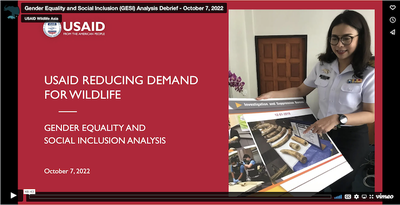USAID Shares Learning from the Gender Equality and Social Inclusion (GESI) Analysis
Understanding that prevalent social, cultural, and gender norms influence and interact with individual and community demand for illegal and endangered wildlife and associated products, RDW undertook the GESI Analysis to provide a systematic overview of the state of knowledge about gender and social dynamics, including the roles and rights of women and traditionally underrepresented groups, such as youth and indigenous populations, that influence illegal wildlife trafficking (IWT) in the ASEAN region. The GESI Analysis outlines the gender and social inclusion context in relation to opportunities for reducing wildlife consumption.
Prof. Joni Seager discussed how gender dynamics feed into IWT. She explained how women may be coerced into poaching or silenced into complicity, saying, “The wheels of IWT are completely greased by pervasive gender-based violence and sexual exploitation.” For men and boys, traditional ideas about masculinity may pressure them into poaching wildlife.
Looking at potential solutions, the different attitudes men and women hold towards wildlife, trafficking, and enforcement may present opportunities to more effectively target counter wildlife trafficking efforts. As shown through USAID’s social and behavior change communication campaigns, shifting attitudes about gender, as related to wildlife consumption, can help to reduce demand for wildlife products. “Wildlife consumption doesn’t just reflect gender roles; it re-creates those roles and kind of doubles down on them, hardens them.”
Suzanne Kelly spoke about the RDW Civil Society and Social Inclusion Analysis, which was designed to complement the GESI Analysis. Speaking about indigenous peoples, youth, and forest-reliant communities, she emphasized that “representation and participation are actually different sides of the same coin, and we need to include both.”
Both studies identified opportunities for further research and advancement of USAID’s gender and social inclusion goals within the USAID RDW Activity. “RDMA’s commitment to gender and social inclusion can be seen mission-wide. We know that gender, age, culture, marginalization, intersectionality, and many other dimensions of the human experience are critical to understanding not only the societal problems we face, but also the opportunities for solutions they provide,” said Craig Kirkpatrick, Regional Wildlife Conservation Advisor of USAID Regional Development Mission for Asia.
Download the RDW GESI Analysis and the RDW Civil Society and Social Inclusion Assessment.
Watch a video of the presentation below.


